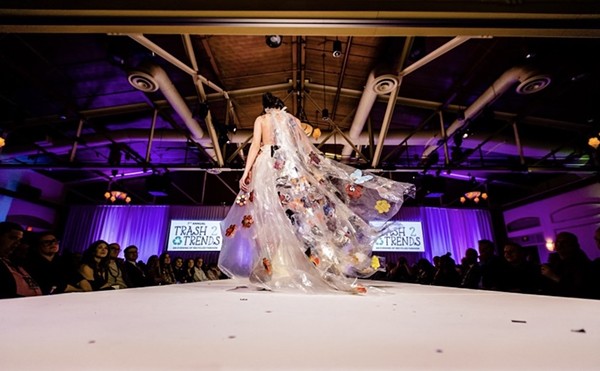The modus operandi of the Mark Two Dinner Theatre is the staging of some very, very big shows on a very, very small stage. In its current production of "Carousel," Rodgers and Hammerstein's landmark musical, we see both the shortcomings as well as the advantages of this kind of presentation.
Billy Bigelow is the dark, brooding and unheroic carousel barker who falls in love with innocent but sagacious Julie Jordan, in a small New England coastal town in the late 1800's. There is nothing to suggest the story's locale other than a few set pieces and a blue-painted scrim, and we certainly never see the show's symbolic centerpiece, the fabled carousel, because if we did, there would be no room for the actors. (There are a few wooden horses in the lobby.)
The lack of space makes it impossible, then, for director Mark Howard to stage any of the major production numbers. In "June is Bustin' Out All Over," June can only trickle out, and "A Real Nice Clambake" is barely a backyard picnic. So Howard must stress the smaller and quieter values of the work and take advantage of the theater's intimacy to showcase character, sentiment and the beauty of the well-known score.
He succeeds to a great extent, because of the excellent performance skills of many in the cast. Lindsay Dyett sings Julie's beautiful "If I Loved You" in a clear and lovely soprano. Molly Conole as best friend Carrie manages both her songs and her comedy with style and skill. W.C. Green portrays Billy Bigelow as a conflicted and angry braggart, who still elicits our sympathy, and his handling of the long "Soliloquy" number in Act One is strong and moving. Michael L. Walters is a delight as the rotund Mr. Snow and uses his powerful lyric tenor voice to great effect. And Heather Magee, as Billy's daughter Louise, performs a poetic ballet that ably captures the mood and spirit of her character.
Howard knows his mostly elderly audience and their conservative tastes. A revival of "Carousel" in New York a few years ago accented some of the darker values of the story, which was based on Ferenc Molnar's 1921 play "Liliom." Undercurrents of class warfare, domestic violence and economic dislocation were highlighted and the mood of the piece was in juxtaposition to its formerly lighthearted reputation. But there are no big ideas and no big pretensions in this "Carousel." Howard simply wants to present some handsome performers singing well-known tunes and in doing so, the show goes down as smoothly as some of the Mark Two's fabled sweet desserts.
To be sure, when the chorus reprises "You'll Never Walk Alone," at the end of Act Two, it's hard not to choke back a small tear for a big love that never had a chance and a faraway coastal town in which an aged carousel is the center of longing and romance: a carousel we never get to see.

















